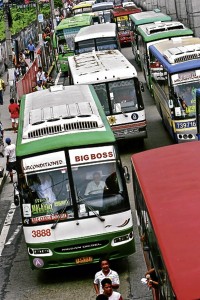‘Mistress, wife, money’ in bus drivers’ minds

In a sensitivity exercise conducted by the Land Transportation Office and performed by public utility bus drivers who had recently figured in road accidents, these were just some the following thoughts running in the drivers’ heads at the time of the mishap: “Hinahanapan ng pera ng asawa (Wife demanding money),” “problema sa kabit (trouble with the mistress),” “’di makasiping ang asawa (couldn’t sleep with the wife),” “delay sa sahod (salary delayed),” “walang sahod (no salary),” “utang (debts),” “pabaon sa anak (allowance of children),” “diperensya ng sasakyan na di pa naayos (vehicle probems that haven’t been fixed),” “damay sa suspension ng kasamahan na nakagawa ng kasalanan (being suspended because of a colleague’s fault).”
The results of the exercises, acquired from several batches of 50 drivers, were consolidated from all bus companies who had records of road accidents. The exercises were called “Traffic Safety Management Seminar Para sa Tsuper Program” and conducted between September 2009 and October 2010. Afterward, the seminar was transferred to the University of the Philippines National Center for Transportation Studies (UP NCTS) in Diliman, Quezon City. This was according to Daisy Jacobo, LTO traffic safety division chief.
The sensitivity exercises for bus drivers took place three years before the recent news that the Metropolitan Manila Development Authority had asked city bus drivers to undergo psychiatric tests and acquire certification from the Technical Education and Skills Development Authority.
Jacobo explained, “Instead of just giving the bus drivers involved in accidents a (traffic) seminar, I (conducted) sensitivity exercises. We debriefed them to process the accidents, and gave them manuals for follow-through activities. We asked them questions, like: “Ano ang pang araw araw na bumabagabag sa yo pag ikaw ay namamasada? Ano ang iyong nararamdaman pagkatapos mong masabi ang bumabagabag sayo? Ano ang iyong nararamdaman matapos mong marinig ang iyong kapwa driver? Ano ang napag alaman mo ukol sa iyong sarili at sa kapwa mo driver? (What bothers you everyday while driving? How does it feel after telling your problem? What do you feel after hearing fellow drivers? What did you learn from yourself and from other drivers?)”
With these questions, drivers seemed to open up and be more open to self-realization. The replies included: “Dapat isa lang ang asawa (There should only be one wife),” full cooperation (when wife asks for money), gumagaan ang pakiramdam (feels good inside),” “pag-iingat sa pagmamaneho (driving defensively),” “hihingi ng advice sa management (will ask advice from management), and “presence of mind.”
Some examples of what the seminar participants learned from themselves include the need for them to be more responsible husbands, fathers, and to check their being hotheaded. “Kulang pa sa kaalaman (lack of knowledge),” “kulang sa disiplina sa sarili (lack of self-discipline),” “ang problema ay dapat iwanan sa bahay, wag dalhin sa trabaho (leave your problems at home),” were some of the actual self-realizations the drivers wrote.
Based on the data, drivers from 20 bus companies participated in the exercise. All the examinees were holders of professional driver’s licenses. As much as the drivers’ responses were diverse, Jacobo said the summarized results required
further analysis.
“The data only shows that we need labor standards. This is what prompted me to coordinate with the DoLE [Department of Labor and Employment]. My proposal to DOLE was that these drivers should be given ample hours of rest. It is more important to count the hours of rest more than the hours of work in relation to fatigue and accident,” Jacobo stressed.
She added, further, that accountability should be in the minds of drivers as well as the operators. “We give them their licenses at the time they are qualified. After issuing licenses and renewing them, so many things can happen. Stress is a factor while driving. If one is angry, aggression may result.” And not far ahead, that aggressive driver could become reckless.
“The entry point (admission of bus drivers for hiring) should be the primary responsibility of employers. Some bus companies whose drivers are absent for a day are guilty of hiring jeepney drivers or provincial drivers who charge cheap daily wages.
“You ask a lot from drivers but you don’t help them. You expect to bring people, cargo to their destination safely, economically and conveniently but the driver is on his own. It’s about time that capitalists look after the welfare of the driver, because it makes good business sense to do that. Accidents are preventable. But if you insist the driver to bring out the bus from the garage even if he is sick, the tendency would be for him to take a cold tablet, which might trigger side effects such as drowsiness.”
